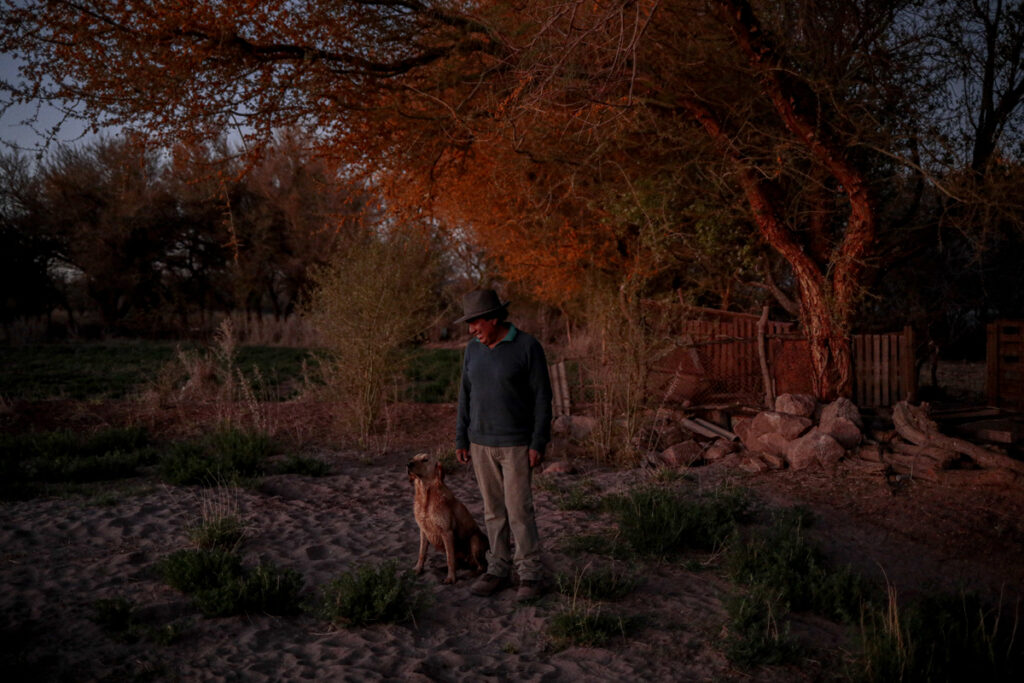
As nationwide protests hit Chile, indigenous communities blocked the roads to nearby lithium extraction sites. Though Chilean authorities are obliged to do so, indigenous groups claim they have never been consulted prior to the mining from their territories.
Nikolaj Houmann Mortensen / @DanWatchDK
On the same October morning that around one million people took to the streets in the Chilean capital of Santiago, members of the indigenous communities of the Atacama blocked the desert’s roads to the nearby lithium extraction sites.
Waving Wiphala flags – the colourful emblem commonly used to represent the indigenous peoples of the Andes – they prevented trucks from using the regular roads to carry out lithium throughout the day. Like in the rest of the country, many were holding signs protesting the Chilean government, but particularly for the Atacama some were displaying banners with paroles against the two lithium mining companies that operates in the area, US American Albemarle and Chilean SQM.
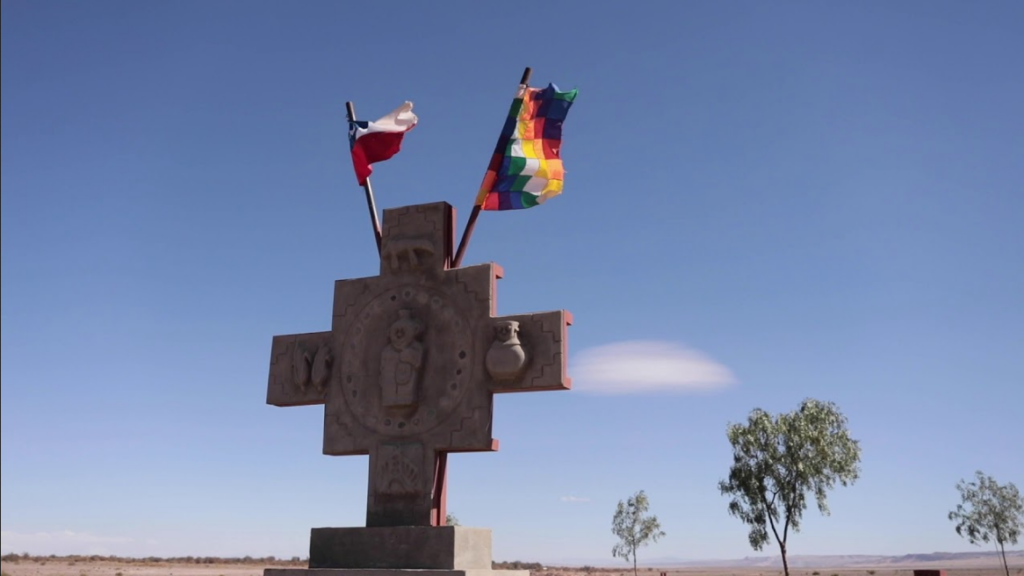
“We hope to continue protesting until the state hears us and attends our legitimate demands,” Sergio Cubillos, then president of the Atacama People’s Council, which represent 18 indigenous communities, told Reuters.
The nationwide rallies against inequality and the absolute power of the government coincide with the views of many representatives of the Atacama’s indigenous Likanantaí communities, who claim their opinion concerning for example the lithium extraction has been neglected for decades.
“The conflict on lithium extraction is really about that the local Likanantaí population does not have any influence on the development of their territory – in this way the conflict is very much connected to the nationwide protests for greater democratization and economic redistribution”, says Maria Cariola, an anthropologist working for the Chilean NGO the Latin American Observatory for Environmental Conflicts.
ONGOING PROTESTS
Skyrocketing global lithium demands for batteries in electronics and electric cars have recently let Chilean authorities pave the way for even more lithium extraction.
Local discontent with the mining has been ongoing amongst the area’s estimated 20.000 Likanantaí peoples for years, but protests have especially flared up over the past two years. In January 2018 the Chilean development agency CORFO signed a contract with SQM that enabled the company to triple its lithium extraction over the next years and extended its mining access to the Atacama until 2030. Though the executive vice president of CORFO had said that the deal was struck after consulting some of the communities that live closest to the extraction, the weeks of demonstrations, roadblocks and even hunger strikes initiated by leaders of the indigenous groups begged to differ.
An expansion of mining licenses on their territory was understood as a major encroachment on the indigenous peoples’ rights, Sergio Cubillos tells Danwatch.
“The lithium mining has a massive impact on us – both our local environment and ecosystems as well as our culture and the social life we have always been practicing”, he says.
THREE COURT CASES
Since January last year the Atacama People’s Council has tried a case against the expansion of mining licenses at both Chile’s Appeals Court and its High Court. And they have taken the matter to the Inter-American Court for Human Rights where a case is currently being prepared.Almost 40 percent of the global lithium supply has come from Chile over the past 20 years, and as Danwatch can reveal, it ends up in some of the most popular electronics and electric cars.
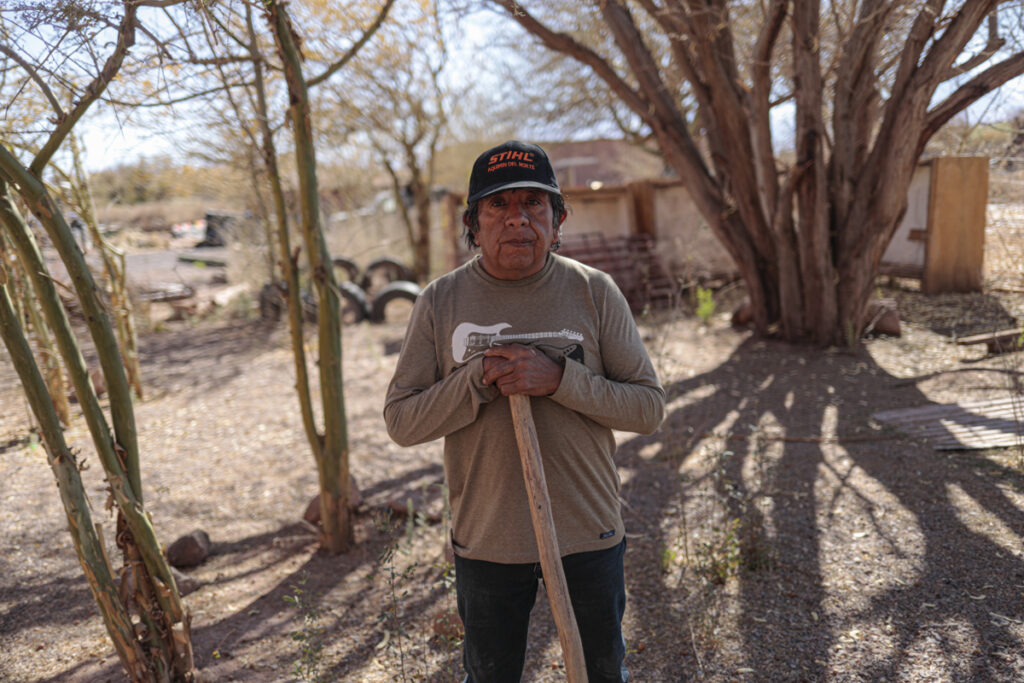
“The race for attracting new investments, pushed by the EV market growth in Europe and the US, is putting both human rights and the ecological value of the salt flats in second place. It is really no wonder the affected people are protesting”, says Ramón Morales Balcázar from the Plurinational Observatory of Andean Salt Flats, a network of people from the Atacama communities, NGOs and researchers in the region.
Had the Chilean state conferred with indigenous communities in the area, the new licenses would have looked different says Sergio Cubillos of the Atacama People’s Council. He emphasises that it is especially the miners’ massive brine and water consumption that worries the indigenous communities and make them fear for the survival of their culture and way of life amid an increasing water scarcity.
“We were never properly consulted on this decision”, he says.
NEVER HAD INFORMED CONSENT
Chile has ratified the International Labour Organisation ILO’s convention 169, which obliges governments to consult indigenous peoples when major projects intervene in their environment and ancestral territory.
SQM’s and Albemarle’s licences to mine lithium in the Atacama however dates back to 1993 and 1982 respectively, many years before the Chilean government signed the convention in 2008. With the renewed contract that prolongs SQM’s license and enables an expansion of its production, the Atacama People’s Council had hoped they would have gotten the opportunity to be heard in the process.
But so far, the council’s case has been rejected by both Chile’s Appeals Court and the High Court. The courts did not rule out that a consultation was necessary when SQM initiate an expansion of its extraction in the future, but for now, the fundamental rights of the surrounding communities had not been violated, the verdict said.
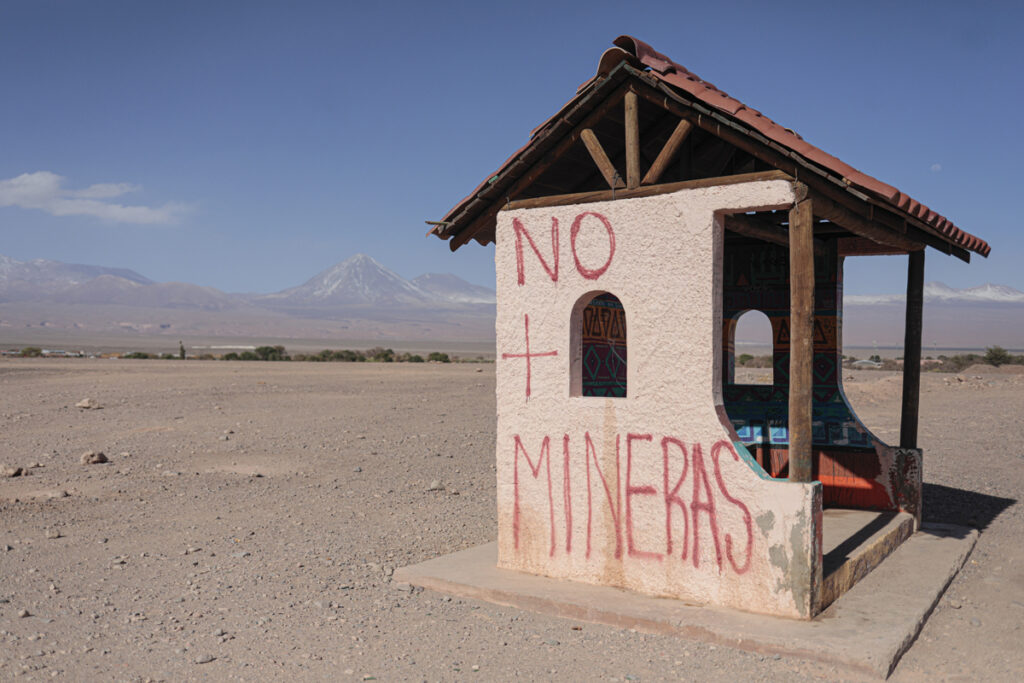
“You have to be very clear that the indigenous peoples of Chile have never been properly consulted in relation to lithium extraction”, says Marcel Didier Von Der Hundt, a lawyer and legal advisor at the Observatorio Ciudadano, a Chilean NGO focused on the promotion of human rights.
“Even if the companies have made contracts with some of the communities about some financial compensation, we have never seen anything that resemble the type of informed consent, that the convention demands”, he adds.
CLEAR-CUT CLAIM FOR CONSULTATION
Former chief advisor on ILO’s programme to promote its Convention 169, Birgitte Feiring, stresses that she cannot comment on the concrete Chilean case, but she points to an example from Ecuador that has set precedent for similar cases in the ILO. Here, an indigenous group won a case about the right to consultation from a company that extracted oil and gas from their territory. The company had initiated the project before Ecuador ratified Convention 169, but because the extraction and its effects were ongoing after the ratification, the indigenous peoples should still be consulted about the impacts of the project, the ILO stated.
“This case set precedent for similar cases. And if a contract is altered and expanded after the ratification of the convention, there is a clear-cut claim for consultation”, Birgitte Feiring says.
PINOCHET’S SON IN LAW
Both SQM and Albemarle have been criticised for not having a proper human rights policy in place.
SQM’s reputation has for long been flawed amongst the Chilean public. Once a state-owned company, it was privatised during the military dictatorship of Augusto Pinochet. Pinochet’s then son in law, Julio Ponce Lerou, was president of the agency supervising the privatisations, and in the process, he bought around one third of its shares for a price that was far below market rates, according to later estimates by Chilean auditors. In recent years, the company has been investigated for several cases of tax evasion, money laundering and illegal campaign funding. Politicians from right to left were exposed in having received massive sums of money to look after the interests of the mining company in a major public scandal in 2014.
“They were financing the whole political class. So, no one in congress would approve a law that would actually supervise what they were doing in their lithium extraction projects”, says Marcel Didier Von Der Hundt from the Observatorio Ciudadano.
MONEY DOES NOT MEAN CONSENT
Albemarle has a different mixt reputation amongst the peoples of the Atacama. From 2016, the company began paying large sums of money for community development purposes to representatives and projects among the nearby indigenous groups. According to the company, as much as three percent of Albemarle’s sales are shared with the Atacama People’s Council, mainly for projects focusing on education, innovation and entrepreneurship.
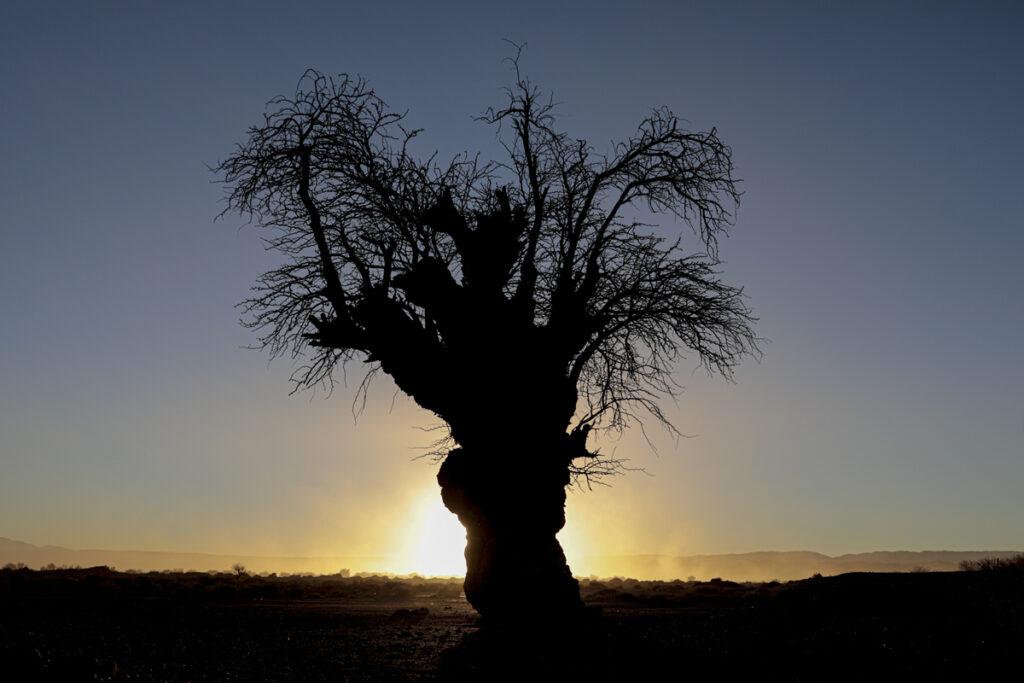
The deal has created some conflicts among the local communities of which some actors and organizations oppose taking money from the mining companies and others are questioning whether the money is mostly going to local elites.
Sergio Cubillos, the former president of the Atacama People’s Council, which has received funding from Albemarle, tells Danwatch that money from the company has especially been used to fund a local team of scientists who will do more research on the environmental impact of the mining and try to inspect whether the companies are extracting more than they are allowed to.
“It is true we receive resources from the company, but that does not mean that we approve of their extraction – they have been mining these minerals for 20 years, but now we can use these money to actually do something about it”, he says.
DOING MORE THAN WHAT THE CONVENTION PRESCRIBES
Albemarle’s Country Manager in Chile, Ellen Lenny-Pessagno, admits that no indigenous consultation has taken place prior to Albemarle’s permission to mine as prescribed by ILO’s Convention 169, but says this is because Albemarle entered Chile’s system for evaluation before the country had ratified the convention. She tells Danwatch that the company has good relations to the communities of the Atacama salt flat and stresses that Albemarle holds monthly meetings with the Atacama People’s Council.
“Our internal processes of dialogue with communities are characterized by being of a higher standard than that required by the Authority to comply with Convention 169”, Ellen Lenny-Pessagno writes in an email and adds that Albemarle’s agreements with local communities are “processes of permanent dialogue and not only to obtain permissions.”
She furthermore points to that the consultation required by Convention 169 is an obligation for governments rather than companies and that there was a certain citizen participation process when Albemarle received its initiate first permit.
Likewise, environment vice president in SQM, Alejandro Bucher, maintains that CORFO’s new agreement with SQM does not require consultation with the indigenous peoples.
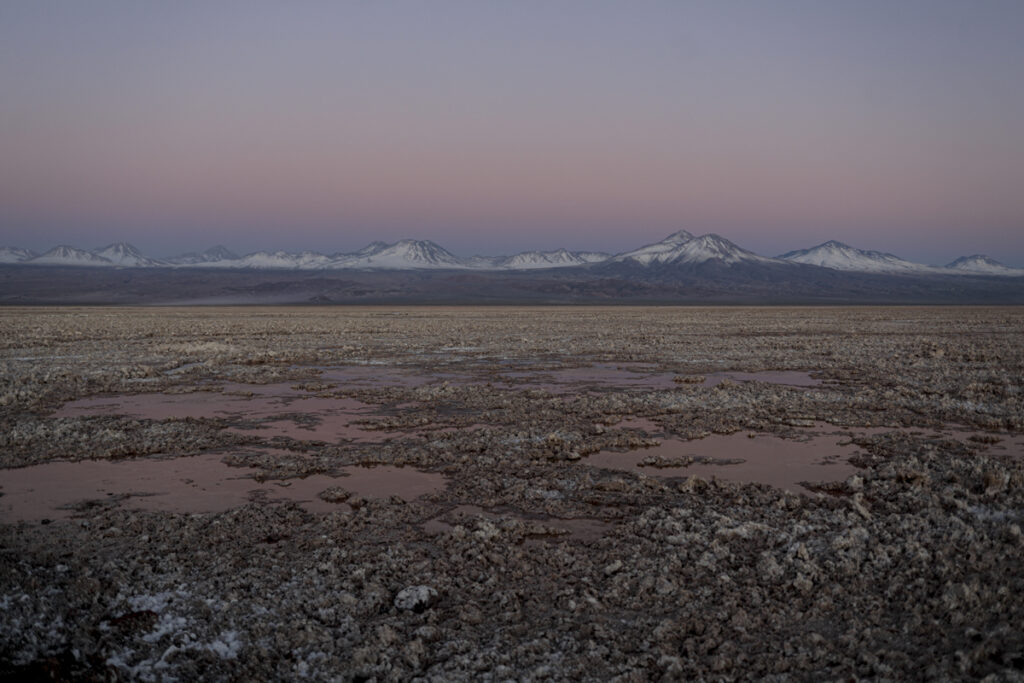
“This was defined by Corfo”, says Alejandro Bucher.
“However, the company has always maintained dialogue and relationship with the communities surrounding the operation”, he adds.
Despite numerous attempts it has not been possible for Danwatch to get a comment from the Chilean State Development Agency CORFO, which owns the mining concessions at the Atacama salt flat and leases it to the lithium mining companies.

